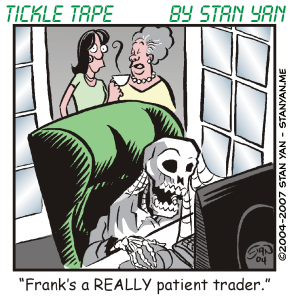Trading isn’t easy. The winning trader must continually search for trading strategies that will produce a profit, and it seems that after one strategy is discovered, it stops working, and the search must start anew. Trading can be discouraging, but it is vital that one continue to persist in the face of adversity. It is essential to be optimistic. That said, one of the biggest problems that traders face is over-confidence. Traders are often too optimistic to the point that they take unnecessary risks. Winning traders are not only optimistic but also realistic.
Trading optimistically yet realistically is easier said than done. There are a number of psychological biases that prevent one from cultivating this ideal mindset. One psychological process is the dual curse of the incompetent. Research studies have demonstrated that there is a tendency for people to believe that they have more expertise than they really do. Most people don’t get adequate information before engaging in a task, such as trading. They are blissfully unaware of their incompetence.
Not only do they lack skills to trade profitably, but they are unaware that they don’t have the proper level of skills, and thus, they don’t try to seek out proper instruction. They base their perceptions of performance, in part, on their preconceived notions about their skills. These notions often do not match objective performance, and they think they can trade better than they actually can. In other words, the reason losing traders are doubly cursed is that they are optimistic but not realistic.
There are dynamic psychological processes for not seeking out realistic information when it comes to developing trading skills. People tend to want to enhance their sense of self, a psychological mechanism called self-enhancement bias. They want to feel good about themselves, and when they feel threatened, they may be especially prone to deny their shortcomings and bias their perceptions so as to build up their sense of self.
When a trader is faced with a series of setbacks, he or she is particularly vulnerable. And this vulnerability compels one to deny one’s shortcomings. Considering that people tend to avoid looking at the truth anyway when a trader is especially prone to feel incompetent and inadequate, he or she will tend to deny all shortcomings and build up one’s ego to the point of becoming unrealistically optimistic.
In the end, it can be hard to take a brutally honest look at oneself. Trading is hard, and if you have a strong desire to trade profitably, it may be difficult to accept just how challenging trading really is. The best way to stay optimistic yet realistic is to keep the big picture in mind and reduce feelings of pressure and stress. The more stress you feel, the more trading errors you’ll make.
And when you start losing money, you’ll not only feel a little discouraged, but you may start holding unrealistic expectations as a defence against feeling poorly about yourself. To stay realistic, you should try to relieve as much fear and stress as possible. Manage risk so that you will feel calm and relaxed. And plan your trades. The more you can plan your trades carefully, the more relaxed you’ll feel. You will trade calmly, logically and profitably. By remaining calm, you can cultivate a mindset that is both optimistic and realistic.


